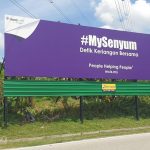By The Malketeer
In a world driven by algorithms and conformity, the call for brands to move beyond the safety realms and confront risks head-on has never been more pronounced. It’s not about playing it safe anymore; it’s about embracing bravery, stepping outside the algorithm, and saying no to the safe word.
At the core of this shift lies the recognition that to truly capture attention and make a lasting impact, brands must prioritise being different over being merely relevant. Algorithms might guide us towards conformity, but it’s the brands that dare to step outside these digital constraints that stand out. Differentiation becomes the key, a principle that challenges the status quo and disrupts the expected.
Moreover, the journey towards boldness involves seeking out irrational responses. Despite our belief in rational decision-making, our emotional, irrational, and nonsensical sides often govern our choices. Brands that can tap into this emotional reservoir and create an irrational connection with their audience have the power to become irresistible, ingrained in the consumer’s subconscious as a no-brainer choice.
Catering to every sense becomes an imperative in the quest for brand distinction. The brand experience should be more than a visual encounter; it should resonate audibly, evoke distinct scents, and be tangible to the touch. Successful branding transcends the two-dimensional and becomes a multisensory journey. It’s about creating a holistic experience that leaves an indelible mark on the consumer’s memory.
In the pursuit of boldness, brands are encouraged to lean into beautiful imperfection and vulnerability. The era of over-engineered perfection is waning, as consumers no longer believe in a world that appears flawless. Instead, they seek authenticity, embracing the messy and imperfect aspects that make a brand human. Vulnerability becomes a strength, forging a genuine connection with the audience that transcends mere product or service transactions.
Consider the iconic brands that have etched themselves into our collective consciousness – they are the ones that have dared to be different, appealed to our emotions, engaged all our senses, and embraced imperfections.
Take Apple, for instance. The tech giant has become synonymous with innovation, pushing boundaries, and introducing products that defy conventional norms. Apple’s distinctiveness goes beyond sleek designs and cutting-edge technology; it’s about challenging the expected, creating an emotional connection with its users, and fostering a sense of belonging to a community that values uniqueness.
Similarly, Nike has built its empire on the ethos of “Just Do It.” The brand encourages consumers to embrace their individuality, take risks, and overcome challenges. Nike’s marketing isn’t just about selling athletic wear; it’s about selling a mindset of fearlessness, pushing beyond limits, and celebrating imperfections as part of the journey to success.
For newer entrants like Airbnb, boldness lies in challenging traditional hospitality norms. By offering unique, unconventional accommodations and encouraging travellers to forge personal connections, Airbnb has disrupted the travel industry. The brand’s success is rooted in its ability to tap into the emotional and irrational aspects of the consumer’s decision-making process.
As brands navigate this landscape of boldness, they must understand that embracing risk isn’t a one-size-fits-all formula. It’s a nuanced journey that requires a deep understanding of the audience, a willingness to experiment, and a commitment to authenticity.
The age of brave and bold brands is here. It’s a call to action for companies to transcend the safety of conformity, differentiate themselves, appeal to emotions, engage every sense, and celebrate imperfection. The brands that heed this call and meander the delicate balance between risk and authenticity will not only capture attention but also carve a lasting place in the hearts and minds of consumers. It’s time to say goodbye to the safe word and embrace the exhilarating journey of bold branding.










